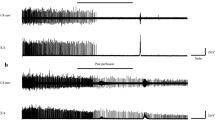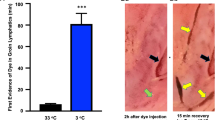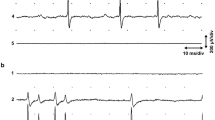Abstract
EXPERIMENTS were carried out with Periplaneta americana and Rana esculenta, after injection with a D.D.T.-emulsion. Action-potentials from the n. cruralis (= 5th nerve, Pringle) of the second thoracic ganglion of Periplaneta were recorded with a special pre-amplifier and a cathode-ray oscillograph. No differences were found between normal and D.D.T.-treated animals in the following preparations : (1) crural nerve only connected with the second leg ; (2) crural nerve only connected with the second thoracic ganglion, which was isolated from the other ganglia and from all peripheral nerves. Hence the D.D.T. causes no increase of spontaneous activity of the sense organs of the leg, nor of spontaneous motor-activity from the isolated ganglion. However, when the reflex path was intact (or partly intact—crural nerve connected with second leg and second thoracic ganglion), the action-potentials of D.D.T.-treated animals showed an abnormal increase in frequency.
This is a preview of subscription content, access via your institution
Access options
Subscribe to this journal
Receive 51 print issues and online access
$199.00 per year
only $3.90 per issue
Buy this article
- Purchase on Springer Link
- Instant access to full article PDF
Prices may be subject to local taxes which are calculated during checkout
Similar content being viewed by others
Author information
Authors and Affiliations
Rights and permissions
About this article
Cite this article
DRESDEN, D. Site of Action of D.D.T. and Cause of Death after Acute D.D.T. Poisoning. Nature 162, 1000–1001 (1948). https://doi.org/10.1038/1621000b0
Issue Date:
DOI: https://doi.org/10.1038/1621000b0
This article is cited by
-
The debate on DDT
Archiv f�r Toxikologie (1972)
Comments
By submitting a comment you agree to abide by our Terms and Community Guidelines. If you find something abusive or that does not comply with our terms or guidelines please flag it as inappropriate.



